Sherry Simon is Professor in the French Department at Concordia University. She has published widely in the areas of literary, intercultural and translation studies, most recently exploring the cultural history of linguistically divided cities and the multilingual cities of the former Habsburg empire. Among her publications are Translating Montreal. Episodes in the Life of a Divided City (2006) and Cities in Translation: Intersections of Language and Memory. (2012), both of which have appeared in French translation. She has edited or co-edited numerous volumes, including Translation Effects: The Shaping of Modern Canadian Culture (with K. Mezei and L. von Flotow), (2014) and Speaking Memory. How Translation Shapes City Life ( 2016). A forthcoming book is entitled Translation Sites: A Field Guide (Routledge 2019) She is a Fellow of the Royal Society of Canada, a recipient of a Killam Fellowship, and a member of the Académie des lettres du Québec
Guest Speakers
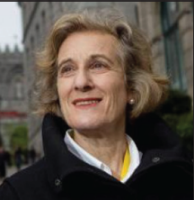
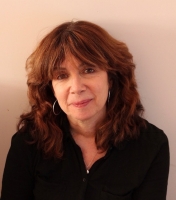
Moira Inghilleri is Professor of Translation and Interpreting Studies at the University of Massachusetts Amherst and the Director of the Translation and Interpreting Studies program. She is the author of Translation and Migration (Routledge 2017) and Interpreting Justice: Ethics, Politics and Language (Routledge 2012). She guest-edited and contributed articles in two special issues of The Translator: Bourdieu and the Sociology of Translating and Interpreting (2005) and Translation and Violent Conflict (2010, co-edited with Sue-Ann Harding) and her work has appeared in numerous edited collections. She was co-editor of The Translator from 2011-2014 and review editor from 2006-2011 and served as series co-editor for the Routledge series New Perspectives in Translation and Interpreting Studies from 2013-2018. In 2017 she was appointed to the Fulbright Specialist Roster for 2017-2020 in the field of translation and migration studies.
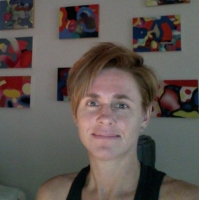
Carmen Ruschiensky holds an MA in Translation Studies and is currently pursuing a PhD in Humanities at the Centre for Interdisciplinary Studies in Society and Culture at Concordia University. Her research explores the translation and mediation of cultural memory in Quebec. Her published articles can be found in Archivaria (2017) and the forthcoming volume Relire les revues québécoises : histoires, formes et pratiques (Élyse Guay and Rachel Nadon, eds.). As a translator, she specializes in the social sciences and humanities. Her recent translations include David Le Breton’s book Sensing the World: An Anthropology of the Senses (2017) and essays by Simon Harel and Alexis Nouss in Speaking Memory: How Translation Shapes City Life (Sherry Simon, ed., 2016).
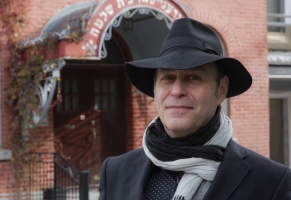
Pierre Anctil is a member of the Royal Society of Canada and a full professor in the department of history of the University of Ottawa, where he teaches contemporary Canadian history and Canadian Jewish history. He was the director of the Institute of Canadian Studies at the University of Ottawa from July 2004 until July 2008. He has written at length on the history of the Jewish community of Montréal and on the current debates on cultural pluralism in Montréal. Among his contributions are translations from Yiddish to French of memoirs written by Jewish immigrants to Montréal in the first half of the twentieth century. He is the author of a literary biography of Montréal Yiddish poet Jacob-Isaac Segal, entitled Jacob-Isaac Segal (1896-1954), un poète yiddish de Montréal et son milieu (Presses de l’Université Laval, 2012). This biography has appeared in 2017 in an English language version at the University of Ottawa Press under the title: Jacob Isaac Segal; a Montreal Yiddish Poet and His Milieu. Recent publications include Les Juifs de Québec, 400 ans d’histoire (Presses de l’Université du Québec, 2015) and Histoire des Juifs du Québec (les Éditions du Boréal, 2017).
Pierre Anctil est professeur titulaire au département d’histoire de l’Université d’Ottawa, où il enseigne l’histoire canadienne contemporaine et l’histoire juive canadienne. Il a été directeur de l’Institut d’études canadiennes de l’Université d’Ottawa de juillet 2004 jusqu’en juillet 2008, date à laquelle il a obtenu une bourse Killam pour une période de deux ans sur la foi d’un projet de recherche intitulé : «Parcours migrant, parcours littéraire canadien : le poète yiddish Jacob-Isaac Segal». Il détient un doctorat en anthropologie sociale de la New School for Social Research de New York (1980) et a fait un stage postdoctoral au département d’études juives de l’Université McGill (1988-1991). Il est membre de la Société royale du Canada depuis octobre 2012. En 2013 il a fait paraître Soyons nos maîtres. 60 éditoriaux pour comprendre Le Devoir sous Georges Pelletier, 1932-1947 (Éditions du Septentrion). La suite de cet ouvrage a paru en 2014, toujours chez le même éditeur, sous le titre : À chacun ses Juifs, 60 éditoriaux pour comprendre la position du Devoir à l’égard des Juifs (1910-1947). Il a publié en avril 2015, aux Presses de l’Université du Québec, en collaboration avec Simon Jacobs, un livre intitulé : Les Juifs de Québec, 400 ans d’histoire. En 2017, aux Éditions Fides, il a publié avec Chantal Ringuet une traduction du yiddish au français de l’autobiographie de Marc Chagall, intitulée : Mon univers puis en 2018, aux Éditions du Boréal, Histoire des Juifs du Québec.
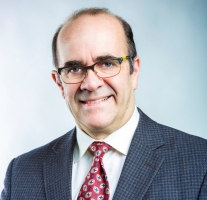
Daniel Salée est professeur titulaire de science politique à l’Université Concordia (Montréal). Il y dirige présentement les programmes d’études supérieures en science politique. De 1997 à 2007, il a été directeur de l’École des affaires publiques et communautaires de l’Université Concordia. Il est également membre fondateur du programme d’études autochtones de l’université, le premier du genre au Québec. Il en assumé la direction à deux reprises en 2011-2012 et en 2016-17. Il a enfin été président de la Société québécoise de science politique en 2014-2015. Analyste reconnu de la vie politique au Québec et au Canada, Daniel Salée s’est intéressé au nationalisme québécois, à la dynamique constitutionnelle canadienne et aux dynamiques sociopolitiques d’interaction entre la majorité eurodescendante et les groupes minoritaires racisés au Canada. Au cours des dernières années, ses travaux ont porté plus spécifiquement sur les rapports de pouvoir entre les peuples autochtones et l’État et la société allochtone en contexte canadien. Le professeur Salée est membre fondateur du réseau DIALOG et membre de son bureau de direction.
Daniel Salée is Professor and Graduate Program Director in the Department of Political Science at Concordia University (Montreal). From 1997 to 2007, he was Principal of the School of Community and Public Affairs at Concordia. He is a founding member of Concordia’s First Peoples Studies Program, the first of its kind in Quebec, which he directed from 2011-2012 and from 2016-17. He also served as President of the Société québécoise de science politique from 2014-2015. A well-known specialist of Quebec and Canadian politics, Daniel Salée’s research focuses on Québécois nationalism, Canadian constitutional issues, and the sociopolitical dynamics of interaction between the European-descendant majority and racialized minority groups in Canada. His work over the past few years has focused more specifically on power relations between Indigenous Peoples and the State and non-Indigenous society in the Canadian context. Professor Salée is a founding member of the DIALOG network and a member of its Executive Office.
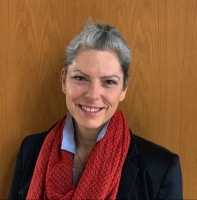
Marie Leconte will defend her PhD thesis this summer. Her doctoral research focuses on Anglo-Québécois literature, its translation into French, as well as how and why its works are able to cross into the field of Québec letters. But beyond the texts, there is also the sociopolitical space in which English-language works from Quebec evolve. In order to better understand its activity, she is turning her attention towards the history of the Quebec Writers’ Federation, an institutional body that represents Anglophone authors in Quebec, starting from its creation to how it has adapted over time to Quebec’s changing political space. Marie has published articles in Québec Studies, the Transcultural Journal of Translation and Cultural Studies and is responsible for the entry “La littérature anglophone du Québec” in the upcoming Atlas littéraire du Québec, published by Fides in 2019. Her research has been funded by a doctoral grant from the FRQSC.
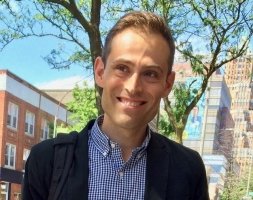
Michael Woodsworth teaches history at Bard High School Early College in Queens, N.Y. His work focuses on the 20th-century United States, particularly urban history, African American history, and the welfare state. He is the author of Battle for Bed-Stuy: The Long War on Poverty in New York City (Harvard University Press, 2016). He holds a PhD from Columbia University and his writing has appeared in the American Historical Review, the International Journal of Canadian Studies, the Wall Street Journal, and Bookforum. He also works with the Bard College Center for Civic Engagement to host international student leaders at the Study of the U.S. Institute on Civic Engagement.


